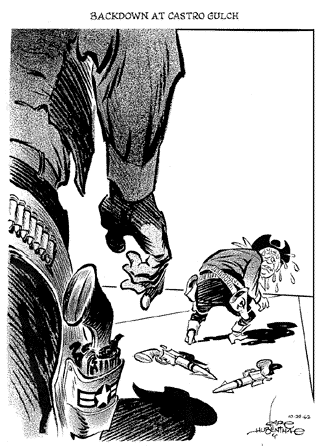

Considered the closest day that the United States was to a nuclear war, the events of October 28, 1962, the final day of the Cuban Missile Crisis, would change American and international politics forever. Beginning on the morning of Sunday, October 28, at six o’clock am, it was reported by the CIA that all of the Cubans ballistic missiles were operational and were in standby waiting for the signal by Khrushchev. In response to this action, President Kennedy allowed the Air Force to also move into position as several American F-102 fighter planes, armed with nuclear missiles, monitored the skies of the Bering Sea and Cuba. With a push of a button, nuclear warheads could have been launched to the Soviet Union and Cuba, resulting with a nuclear war. However, President Kennedy and Khrushchev met between the hours of six and nine o’clock am, and after their long discussion, war was averted. Both President Kennedy and Khrushchev had met each other’s demands, and people around the world began to rejoice. In his article, John Simkin explains that the terms to the agreement between the superpowers included that Khrushchev would remove the nuclear missiles from Cuba and all soviet troop would leave Cuba, while President Kennedy agreed to not invade Cuba or the Soviet Union and remove all missiles from Italy and Turkey (“Cuban Missile Crisis,” par. 24-28). It was also agreed upon that both nations would establish a direct communications link known as the Hot Line, in order to avoid future dangerous confrontations, and a Test Ban Treaty which prohibited the testing of nuclear weapons in the atmosphere (“Cuban Missile Crisis,” par. 24-26). Following the scare of the Cuban Missile Crisis, in the United States, President Kennedy, EX-COMM, and the JCS were praised as heroes for never backing down to the Soviets and for escaping World War III, while in the Soviet Union; Khrushchev faced much disappointment as he was never forgiven by his people for losing to America. Though the world had been saved by the actions of President Kennedy, EX-COMM, the JCS, and Khrushchev, the conflict known as the Cold would still exist between the Americans and Soviets for nearly three more decades until peace was finally achieved in 1989.
Blog Date: May 8, 2011
Historical Date: October 28, 1962
http://www.bobstaake.com/karl/images/hubie_edit_gulch.gif
http://www.virginiawestern.edu/faculty/vwhansd/his112/Images/NikitaK_JackKennedy.jpg
No comments:
Post a Comment